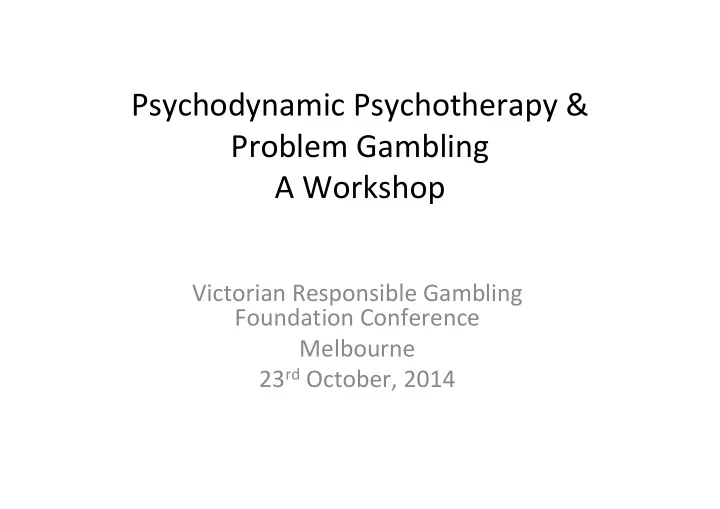

Psychodynamic Psychotherapy & Problem Gambling A Workshop Victorian Responsible Gambling Foundation Conference Melbourne 23 rd October, 2014
Running Order • 1pm – Introductions • What is psychodynamic psychotherapy – definitions, ideas, workshop goals. • Where does gambling fit in? • 1.30pm ‐ Transference & Counter ‐ transference • Attachment theory and psychotherapy • Containment & Holding • 2.15pm ‐ Case Study • 2.30pm ‐ Tea/Coffee • 2.45 ‐ Groups • 3.15 – Group Feedback & Conclusions • 3.45 ‐ End
What is psychodynamic psychotherapy? • Catholic confession – circa. 1215 • Aristotle’s “catharsis” • Freud and the couch • Blank screen • Making the unconscious conscious • Remembering, repeating, working through
• Psychotherapy & Gambling • Gambling treatments: shorter term, CBT focused • UCLA – Residential gambling program • Short ‐ term/long ‐ term? • Resources & evidence ‐ base
Clip: countertransference
Transference: defintion “the experiencing of feelings, drives, attitudes, fantasies and defences toward a person in the present, which do not befit that person but are a repetition of reactions originating in regard to significant persons of early childhood, unconsciously displaced onto figures in the present. The two outstanding characteristics of a transference reaction are 1. it is a repetition and 2. it is inappropriate.” Ralph Greenson, 1967
Transference • Transference as a block • Shadow of the object • Intensified under stress/anxiety/illness • Breuer and the “private theatre” • Institutional transference • Transference interpretations
DRIVER PARKING INSPECTOR PARENT PARENT ADULT ADULT CHILD CHILD
DRIVER PARKING INSPECTOR PARENT PARENT ADULT ADULT CHILD CHILD
PATIENT THERAPIST PARENT PARENT ADULT ADULT CHILD CHILD
PATIENT THERAPIST PARENT PARENT ADULT ADULT CHILD CHILD
Attachment theory & psychotherapy • Bowlby, Ainsworth & the 44 thieves • What’s your attachment style? • Attachment style questionnaire • Peter Fonagy & Psychoanalysis • Attachment theory & addiction
Clip: Will
Containment & Holding • Bion – containment • Alpha function & thinking • Winnicott – holding • Primary maternal preoccupation
Containing & Holding “Mrs. Darling first heard of Peter when she was tidying up her children's minds. It is the nightly custom of every good mother after her children are asleep to rummage in their minds and put things straight for next morning, repacking into their proper places the many articles that have wandered during the day. If you could keep awake (but of course you can't) you would see your own mother doing this, and you would find it very interesting to watch her. It is quite like tidying up drawers. You would see her on her knees, I expect, lingering humorously over some of your contents, wondering where on earth you had picked this thing up, making discoveries sweet and not so sweet, pressing this to her cheek as if it were as nice as a kitten, and hurriedly stowing that out of sight. When you wake in the morning, the naughtiness and evil passions with which you went to bed have been folded up small and placed at the bottom of your mind and on the top, beautifully aired, are spread out your prettier thoughts, ready for you to put on.” ‐ J.M . Barrie, Peter Pan
Recommend
More recommend